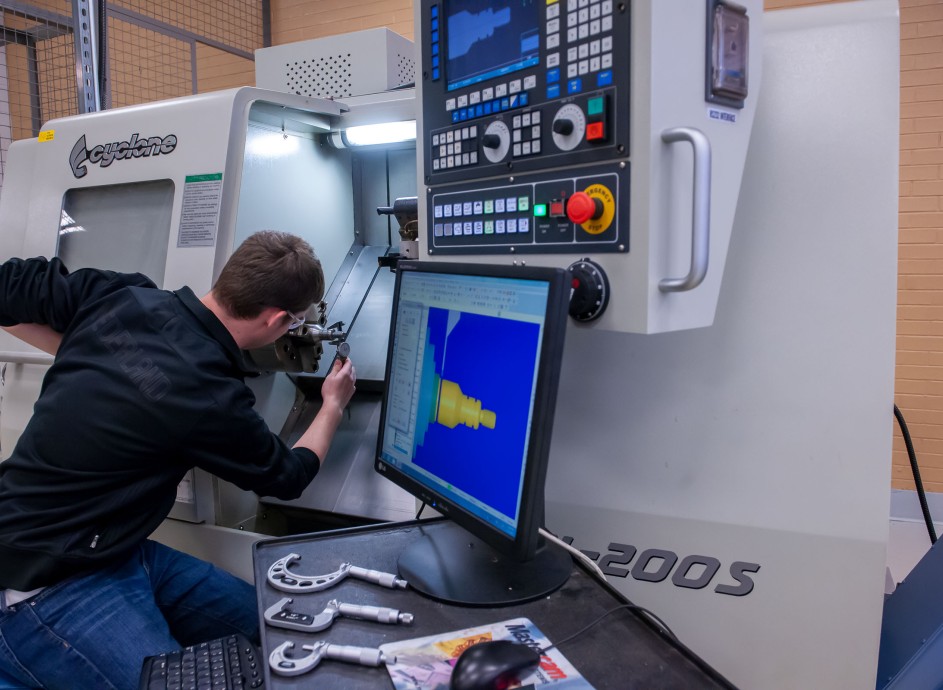Mechanical Engineering Technician - CNC/CAM

*Domestic applicants include Canadian citizens, permanent residents, protected persons and Convention refugees.
In many ways, computers are at the centre of the manufacturing industry. They run the machines that keep our economy strong and dynamic. They also need strong and dynamic technicians to ensure they don’t break down and are working to their full potential. If you’re excited by the opportunity to work with cutting-edge software in a career that is challenging and highly rewarding, the Mechanical Engineering Technician - CNC/CAM program will give you the skills needed to manufacture the perfect career.
As a student, you’ll focus your learning on machine trade theory, machine shop, mechanical blueprint reading and applied mathematics and Computer Aided Design (CAD). You'll get hands on experience with the computer applications and software used in Computer Aided Machining (CAM) and Computerized Numerical Control (CNC) programs. You’ll have cutting –edge knowledge for the always evolving computer manufacturing world. Plus, There's also a mandatory co-op placement in year two of the program, so you can earn while you learn, testing your knowledge in real situations, in real machine shops.
When you graduate, you'll be qualified to work in production and jobbing shops, aircraft and aerospace, automotive, cabinetmaking, agricultural machinery production, instrumentation and service industries. Begin manufacturing your career today.
The Mechanical Engineering Technician – CNC/CAM program offers a cooperative education component, which provides students the opportunity to gain invaluable first-hand workplace experience in their chosen field. Here are some co-op jobs that have kick-started the careers of some Mechanical Engineering Technician – CNC/CAM students before even graduating!
CNC Set Up Operator
Understand and modify CNC programs.
CNC Mill
Read and interpret engineering drawings, blueprints and charts.
Production Employee
Perform a variety of manufacturing tasks in relation to the quality production of exhaust manifolds.
For more information regarding co-op, please check out our co-op site or contact the Co-op Office at coop@fanshawec.ca to connect with a consultant.
Graduates of Fanshawe’s Mechanical Engineering Technician – CNC/CAM program have the knowledge and skills to become vital members of progressive, technologically modern companies. Graduates can expect to find work in production and custom job shops, aircraft and aerospace, automotive, cabinet-making, agricultural machinery production, instrumentation and service industries.
Did you know Fanshawe consistently ranks high in graduation employment rates among large colleges in Ontario?
Here are some examples of career opportunities for graduates of Fanshawe’s Mechanical Engineering Technician – CNC/CAM program:
CNC Machinist
Responsible for the set up and troubleshooting of CNC programs and parts inspection.
CNC Operator
Operate CNC for solid wood machining.
CNC and Manufacturing Assembly Technician
Setup and operate CNC machine tools and measure, examine and test completed products for defects.
| Fall | Winter | Summer |
|---|---|---|
| Academic Level 1 | Academic Level 2 | Academic Level 3 |
| Co-op | Co-op |

"The time I spent at Fanshawe was one of the best phases of my life. Not only because I learned a trade upon which I can build a fruitful career, but also the people and the surrounding environment were always full of positive vibes which helped a lot for a first-timer like me to integrate into the Canadian way of life."
The graduate has reliably demonstrated the ability to:
Wayne DeJong
Ontario Secondary School Diploma (OSSD), or equivalent, or a mature applicant.
Students who do not have a high school diploma may wish to consider taking the Academic and Career Entrance (ACE) grade 12 Equivalency Certificate. Alternatively, applicants may choose to do the one-year Pre-Technology preparatory program that provides all the admissions requirements for this program.
| Test | Score |
|---|---|
| TOEFL iBT | 79 |
| IELTS Academic | Overall score of 6.0 with no score less than 5.5 in any of the four bands |
| CAEL | Overall score of 60 with no score less than 50 in any of the four bands. score of 80 in listening |
| PTE Academic | 53 |
| Cambridge English | Overall score of 169 with no language skill less than 162 |
| ESL4/GAP5 | Minimum grade of 80% in Level 8, 75% in Level 9, or 70% in Level 10 |
| Duolingo | Overall score of 105, with no score lower than 95 |
Where the number of eligible applicants exceeds the available spaces in the program, the Applicant Selection Criteria will be:
| Level 1 | ||||
| Gen Ed - Take a 3 credit General Education elective course. | ||||
| Take all of the following Mandatory Courses: | ||||
| DRAF-1056 | Blueprint Reading | 3 | ||
| This basic course introduces the student to mechanical blueprint reading. Topics covered will include lines, dimensioning, tolerances, types of projection and methods to interpret working drawings. | ||||
| CADD-1060 | Computer Aided Design 1 | 3 | ||
| This course is designed to introduce the student to two dimensional CAD (computer aided design) using 2D CAD software. Topics will include the setup of the user interface, file management, creating and editing two dimensional geometry, analyzing and editing of geometry to ensure compatibility for use in toolpaths and creating engineering drawings. | ||||
| DEVL-1054 | Skills for Career Success | 2 | ||
| This course will cover topics in digital literacy, career management and workplace communication. | ||||
| MACH-1130 | Conventional Machine Shop 1 | 5.5 | ||
| This course will enable the student to produce machined metal parts to the specifications of a technical drawing, by means of safely operating milling machines, lathes, and surface grinders. | ||||
| COMM-1004 | Language & Communication Skills 1 | 3 | ||
| COMM1004 provides the student with an opportunity to establish skills in reading, writing and editing documents for work-related and personal uses. Students will also practice important study/reading skills and apply grammar rules. | ||||
| MECH-1075 | Conventional Machining Theory | 3 | ||
| This course is an introductory metal machining theory course covering safety, metrology, drills, lathes, grinders and milling machines. | ||||
| MATH-1212 | Mathematics for Trades 1 | 2 | ||
| An introductory level course that teaches students the necessary mathematical skills that will enable them to be successful in the trades programs. | ||||
*Total program costs are approximate, subject to change and do not include the health and dental plan fee, bus pass fee or program general expenses.